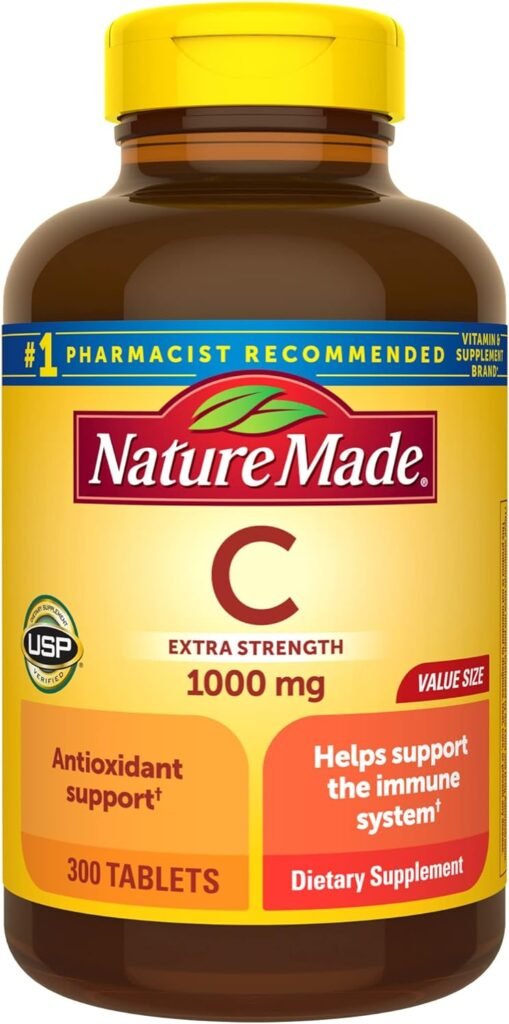
Introduction
VITAMIN C is important for supporting immune health. It helps the body defend against infections and illnesses. It is essential in your daily diet. Lets discuss it.
1.Immune Function Support
Vitamin C is known for its ability to enhance the function of various immune cells, including white blood cells and lymphocytes. Besides, These cells play a crucial role in defending the body against pathogens and infections. Thus, Its make as an essential nutrient for a strong and healthy immune system.
2.Antioxidant Properties of Vitamin C
Vitamin C is a powerful antioxidant that helps protect cells from damage caused by free radicals. By neutralizing these harmful molecules, it also helps reduce inflammation and oxidative stress in the body. It also can weaken the immune system and make it more susceptible to infections.
3.Collagen Production
Vitamin C is essential for the production of collagen, a protein that plays a key role in maintaining the integrity of the skin, blood vessels, and connective tissues. By promoting collagen synthesis, it helps support the body’s natural barrier against pathogens and strengthens the immune system.
4.Wound Healing
Vitamin C is also important for wound healing. It helps the body form new blood vessels, connective tissue, and skin cells, preventing infections and supporting the body’s immune response to injuries and wounds.
5.Respiratory Health
Vitamin C has been shown to have a protective effect on the respiratory system. It’s particularly reduce the severity and duration of respiratory infections such as the common cold and flu. Vitamin C is a crucial nutrient that plays a vital role in enhancing the body’s immune system and promoting optimal lung function.
6.Vitamin C Reduced Risk of Chronic Diseases
Studies have shown that vitamin C may help reduce the risk of chronic diseases such as heart disease, cancer, and diabetes. By supporting immune function and reducing inflammation, it can help protect against the development of these conditions and support overall health and well-being.
7.Vitamin C Enhanced Iron Absorption
Vitamin C plays a key role in enhancing the absorption of iron from plant-based sources, such as leafy greens and legumes. By improving iron uptake, it helps prevent iron deficiency anemia, a condition that can weaken the immune system and make the body more susceptible to infections.
8.Stress Reduction
Vitamin C has been shown to help reduce the negative effects of stress on the immune system. By supporting the production of stress hormones and reducing oxidative stress in the body, it can help boost immune function and protect against the harmful effects of chronic stress on overall health.
9.Eye Health

Vitamin C is essential for maintaining healthy eyes and preventing age-related eye diseases such as cataracts and macular degeneration. Consume vitamin C helps to protect the eyes from oxidative damage and inflammation. Additionally, it can support vision health and reduce the risk of eye-related infections and illnesses.
10.Overall Well-being
Vitamin C not only boosts the immune system but also supports overall health and well-being. It helps promote healthy skin and hair, improve mood and energy levels. It also enhance the body’s natural defenses for optimal functioning of all bodily systems.
Dos and Don’ts of Vitamin C:
- Do include vitamin C-rich foods in your daily diet, such as citrus fruits, berries, peppers, and leafy greens.
- Consult healthcare provider before high-dose vitamin C.
- Don’t exceed the recommended daily intake of VITAMIN C as excessive intake can lead to potential side effects.
- Don’t rely solely on vitamin C supplements; aim to obtain this nutrient from a balanced diet rich in whole foods.
Recommended Dosage of Vitamin C:
Upper limits for vitamin C supplements:
- 400 mg for young children
- 1,200 mg for children aged 9-13
- 1,800 mg for teenagers
- 2,000 mg for adults
These recommendations should be considered when adjusting vitamin C intake. Factors such as smoking, health conditions, and diet can affect individual requirements.
Side Effects:
- While VITAMIN C is safe in recommended amounts, consuming too much can cause digestive problems, kidney stones, and iron overload.
- It’s essential to monitor your intake and consult with a healthcare provider if you experience any adverse reactions.
Conclusion
VITAMIN C is crucial for your immune system and overall health. Consuming foods rich in vitamin C, following recommended amounts, and being aware of potential side effects can help boost your body’s defenses. Visit the FAQ section for more information and answers to common questions about vitamin C.
FAQs:
- Can I use VITAMIN C if I have sensitive skin?
Absolutely! While using vitamin C on sensitive skin is feasible. it’s crucial to opt for a gentle formulation and conduct a patch test before full application. - How long does it take to see results from using vitamin C?
Results from vitamin C usage may vary based on individual skin types. It noticeable improvements are typically visible within a few weeks of consistent use. - Can I use vitamin C products with other active ingredients?
Certainly! It’s safe to incorporate vitamin C products with other active ingredients. However, introduce new products gradually and monitor your skin’s reaction to the combination.
Remember, it’s important to maintain good health by eating well and exercising regularly. This will improve your immune system and keep you feeling great. By ensuring you get enough vitamin C and taking care of yourself, you can boost your body’s ability to fight off infections and stay healthy.
Follow us for more update. Click HERE to get more info.




